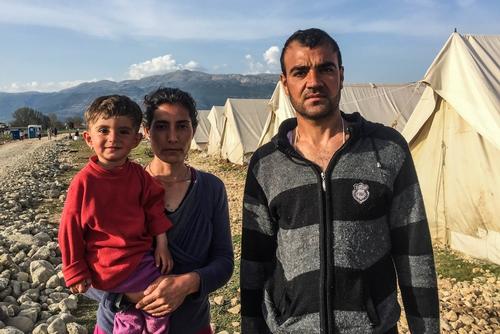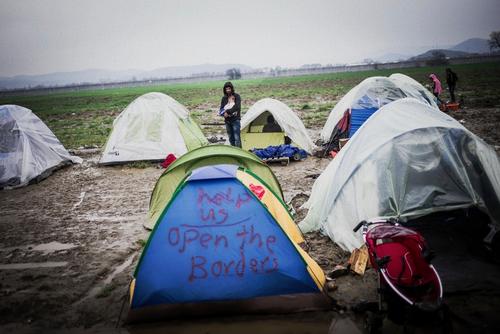Katsikas Camp, Greek city of Ioannina, near Albanian border
In Katsikas, a Greek camp for asylum-seekers, members of the Yazidi religious community have counted themselves: they are 242. They didn’t know each other before. They met in Greece’s Piraeus port, and decided to stay together for mutual support.

Khaled’s family
Khaled, 36, comes from a village called Kojo, south of Sinjar in Iraq. He is in Katsikas with his wife, Dalal, 34, and their one and a half year old son Barakat.
“One day, Daesh [the Islamic State] came to the area and they told us to convert to Islam,” Khaled said. “We refused.”
“Then on 3 August they attacked – there were small clashes near Kojo, but there were no weapons to fight back. (Daesh) defeated the little resistance, and then they started to shoot men and teenagers on the street. There were shooting and beheading executions. They took many children and kidnapped the women, including old women. There was a state of hysteria. They kidnapped some 5,000 people – women and children. The women were kept in an area of Iraq.
“One of the women told me after she was freed – people paid for her to be bought and freed. They were still being kept in Iraq. They were raping them whenever they wanted. They were being kept in a place without a shower, and they couldn’t wash except when someone wanted to rape her, he would bathe her first. There was selling or giving the women as gifts, and also giving women in exchange for weapons between the fighters in Iraq and Syria.”
Khaled's family left Sinjar in early August 2014, spending three days in Dohuk before going on to Diyarbakir in Turkey where they stayed until the end of February 2016. They left Turkey from Izmir, arriving in Lesbos, Greece before travelling on Athens, and then stopping in a town near Ioannina, where they stayed on a basketball court with some 500 Iraqis and Syrians who were all brought to Katsikas camp. They’ve been here for two weeks.
Shemi, Khaled’s mother, is 74 years old, and is wearing a traditional white robe. “I love everyone in the world,” she said. “In our religion the first thing that we pray for is for everyone to live in peace. We are such a peaceful people. I don’t know what is the problem that everyone in the world including our neighbour villages became our enemies, and they watched while we were being murdered. I can’t understand what problem the world has with us. We just want to live in joy, we love music, we love to dance. The Yazidi people have never attacked anybody. I think this is the worst moment in Yazidi history.”
“We thought that Europe might protect people who have suffered the kind of suffering we have undergone. But we feel like criminals, forced to hide in the mountain. Look at where we are. We pray that someone hears us, so that the road opens. I don’t want to die here. I don’t want to die watching my grandchildren suffering. I don’t have much time left on this Earth, so I don’t have much longer to wait. Ever since what happened in Sinjar, I haven’t sung any more.”
The family apologized twice because they had no tea to offer, and offered to share the food distributed by the NGO.
Nayef Khudur’s family
A driver in Sinjar, Nayef Khudur is 28 and his wife Zeina Khalaf is 26. They are in the camp with their three daughters, Manal, 9, Maram, 7 and Katherine, who is one and a half. Their son went to Germany four months ago with his grandmother.
Nayef’s house was badly damaged by a blast in Sinjar. After they lost everything they went to Suleimaniyeh by walking and hitch hiking. Friends got him a job in a chicken farm. The salary was good so he managed to put together the money he needed to go to Turkey. They took a plane to Istanbul with a visa. When they reached Izmir, the whole family was detained and thrown in a cell. The situation there was very bad, and they felt “treated like dogs.”
On 28 February, 2016, he left Turkey from Bodrum and went to Greece. “We are here, and thank God our situation is better than in other parts of Greece,” he said. “And thank God our situation is better than prison in Turkey or for those still in Iraq.” He is convinced that “the sun will rise again and we will be with our son again in Germany.”
When he was in his village he weighed 75 kilos. Now he weighs 55 kilos. “Thank God for everything and that our children are well,” he said. “As Yazidis we are used to crisis, but this time it was too much. Between being refugees now and what happened to us with Daesh, it’s too much to bear. I hope this nightmare ends.”




